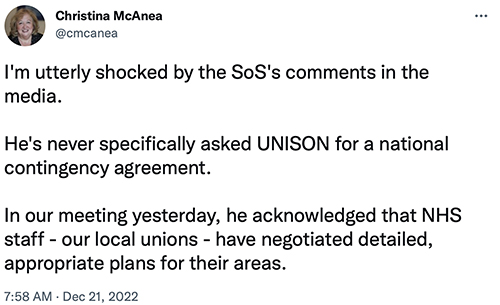Ambulance crews working for five services in England – London, Yorkshire, the North West, North East and South West – are to go on strike over pay and staffing on Wednesday 21 December, says their union UNISON today (Tuesday).
The pre-Christmas date coincides with action being planned by two other unions – GMB and Unite – with members in ambulances services in England.
The UNISON strike involving paramedics, emergency care assistants, ambulance technicians and other 999 crew members will run from midday to midnight.
The ambulance workers are to be joined by nurses, porters, healthcare assistants, cleaners and other NHS workers at two Liverpool hospitals, who will also take action that day.
The strike at the Liverpool Heart and Chest Hospital and Liverpool University Hospital starts at 07.30 on Wednesday 21 December and ends 24 hours later.
UNISON is also about to begin reballoting around 13,000 NHS staff working for ten trusts and ambulance services where turnout in the recent strike vote fell just short of the threshold required by law.
These ten NHS employers include all the remaining ambulance services in England – West Midlands, East Midlands, East of England, South East Coast and South Central.
In addition, staff working at Great Ormond Street Hospital, Liverpool Women’s Hospital, London’s Tavistock and Portman NHS Foundation Trust and the North West-based Bridgewater Community Trust are being asked again to vote for strike action. UNISON members at NHS Blood and Transplant are also being reballoted.
Commenting on the pre-Christmas strike, UNISON head of health Sara Gorton said: “The government will only have itself to blame if there are strikes in the NHS before Christmas.
“Ambulance staff and their health colleagues don’t want to inconvenience anyone. But ministers are refusing to do the one thing that could prevent disruption – that’s start genuine talks about pay.
“Wages are too low to stop health workers quitting the NHS. As more and more hand in their notice, there are fewer staff left to care for patients. The public knows that’s the reason behind lengthy waits at A&E, growing ambulance delays, postponed operations and cancelled clinics.
“Threatened NHS strikes in Scotland were called off because ministers there understand higher wages and improved staffing levels go hand in hand. Unfortunately, the penny’s yet to drop for the Westminster government.”
Senior managers in the five ambulance services and two NHS trusts are due to receive formal notification of the strike and will draw up emergency cover plans to put to the unions taking action.
Notes to editors:
– GMB members working for the following ambulance services – South West, South East Coast, North West, South Central, North East, East Midlands, West Midlands, Yorkshire and Wales – are also taking action on Wednesday 21 December. Unite is due to take out its members the same day at three English ambulance services in the North West, North East and West Midlands.
-Health workers belonging to UNISON and working in Northern Ireland have already voted to take action over pay and staffing. Yesterday (Monday), NHS staff began taking what is known as action short of a strike. This means working to their contracts, ending their shifts on time and refusing overtime. This continues until next Monday (12 December) when they’ll then be striking for the day. In Scotland, UNISON is recommending its NHS members vote to accept the latest offer from Holyrood, which will see a £2,205 increase for the lowest paid staff, and more for those on higher bands. That vote also closes next Monday. In Wales, UNISON members working for the Welsh Ambulance Service are also to be reballoted. The start date for this, and for the plans to reballot staff at ten NHS employers in England, are to be confirmed.
-In July the government in Westminster announced most NHS staff on Agenda for Change contracts (NHS terms and conditions) in England would get a pay rise of £1,400, in line with the recommendation of the NHS pay review body. This amounted to a 4.75% increase to the NHS pay bill. Health workers had been due a wage rise on 1 April. Health workers in Wales got the same award. The health minister in Northern Ireland said he wanted to implement this award but could not do so due to the political stalemate. This means NHS workers there have still had no pay rise at all.
-UNISON and most other health unions had called for an above-inflation pay rise in their submission to this year’s NHS pay review body.
Media contacts:
Liz Chinchen M: 07778 158175 E: press@unison.co.uk
Anthony Barnes M: 07834 864794 E: a.barnes@unison.co.uk
The article Start talking to avert health strikes later this month first appeared on the UNISON National site.

